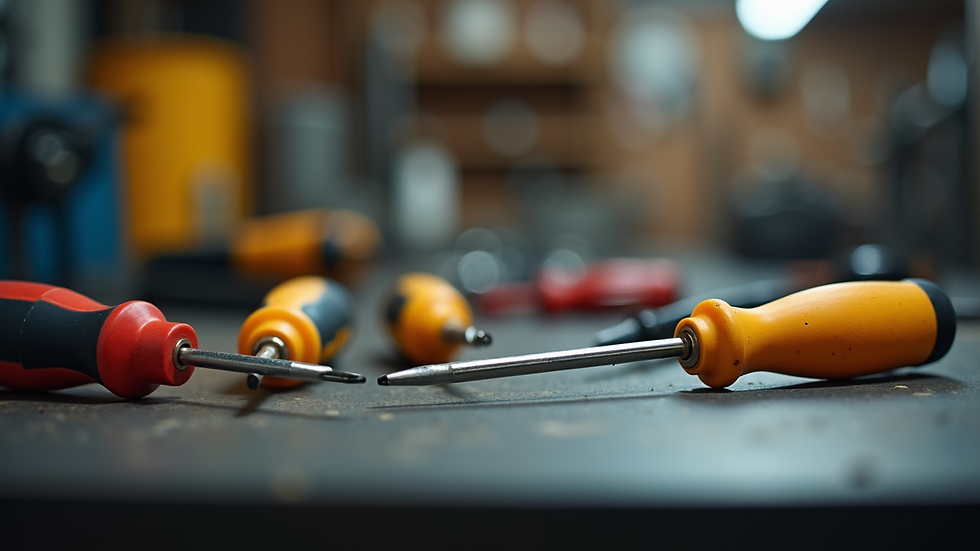Emergency Electrical Repair Essentials
- amaggiani61
- Sep 15
- 3 min read
When electrical problems strike, they often come without warning. A sudden power outage, a sparking outlet, or a breaker that keeps tripping can disrupt your day and even pose safety risks. That’s why knowing the essentials of emergency electrical repair is crucial. I want to share practical tips and insights to help you handle these situations confidently and get your home or business back on track quickly.
Understanding Quick Electrical Repairs: What You Need to Know
Quick electrical repairs are all about speed and safety. When you notice an electrical issue, the first step is to assess the problem carefully. Is it a simple fix like replacing a blown fuse, or something more serious like faulty wiring? Knowing the difference can save you time and prevent further damage.
Here are some common quick electrical repairs you might encounter:
Resetting tripped circuit breakers
Replacing blown fuses
Fixing loose or damaged outlets
Repairing faulty light switches
Addressing minor wiring issues
Always remember, safety comes first. Before attempting any repair, turn off the power at the main breaker. Use a voltage tester to confirm the power is off. If you’re unsure or the problem seems complex, it’s best to call a professional.

Essential Tools and Safety Gear for Quick Electrical Repairs
Having the right tools and safety gear makes quick electrical repairs easier and safer. Here’s a list of essentials I always keep handy:
Voltage tester: To check if wires or outlets are live
Insulated screwdrivers: To avoid electric shocks
Wire strippers and cutters: For handling wires safely
Electrical tape: To insulate exposed wires
Multimeter: For measuring voltage, current, and resistance
Flashlight: Power outages can happen anytime
Rubber gloves and safety glasses: For personal protection
Using these tools correctly can help you fix minor issues quickly and avoid accidents. For example, a voltage tester lets you confirm that the power is off before touching any wires. This simple step can prevent serious injuries.

When to Call for Professional Help
While quick electrical repairs can solve many problems, some situations require expert attention. If you experience any of the following, it’s time to call a licensed electrician:
Frequent breaker trips or blown fuses
Sparks or burning smells near outlets or switches
Flickering or dimming lights
Electrical shocks when touching appliances
Outlets or switches that feel warm or hot
Visible damage to wiring or electrical panels
These signs often indicate deeper issues that need professional diagnosis and repair. Attempting to fix them yourself can be dangerous and may cause more damage.
If you ever find yourself in urgent need, don’t hesitate to seek emergency electrical repairs. Quick response from professionals can prevent hazards and restore your power safely.

Tips for Preventing Electrical Emergencies
Prevention is always better than repair. Taking simple steps can reduce the risk of electrical emergencies and keep your system running smoothly. Here are some tips I recommend:
Regular inspections: Schedule annual electrical inspections to catch problems early.
Avoid overloading circuits: Don’t plug too many devices into one outlet or power strip.
Use quality electrical products: Cheap or counterfeit items can cause failures.
Keep outlets and switches dry: Water and electricity don’t mix.
Replace old wiring: If your building is older, consider upgrading outdated wiring.
Install surge protectors: Protect your devices from power surges.
By following these tips, you can minimize the chances of sudden electrical failures and keep your home or business safe.
Staying Prepared for Electrical Emergencies
Being prepared for electrical emergencies means having a plan and the right resources ready. Here’s what I suggest:
Know your electrical panel: Label breakers clearly so you can quickly shut off power if needed.
Keep emergency contacts handy: Save the number of a trusted electrician for quick access.
Have backup lighting: Keep flashlights and batteries in an accessible place.
Educate family or staff: Make sure everyone knows basic electrical safety and what to do in an emergency.
Preparation helps you stay calm and act fast when electrical issues arise. It also reduces downtime and keeps everyone safe.
Electrical problems can be stressful, but with the right knowledge and tools, you can handle many quick electrical repairs yourself. Remember, safety is the top priority. When in doubt, always reach out to professionals who specialize in emergency electrical repairs. Staying prepared and informed ensures your home or business stays powered and protected.
By following these essentials, you’ll be ready to tackle electrical issues confidently and keep your space running smoothly.





Comments